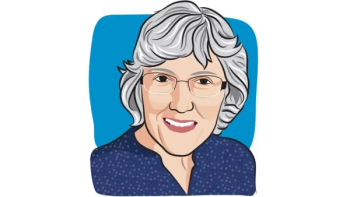
Reasons to Get Genetic Testing for BRCA
Transcript:
Angeles Alvarez Secord, MD: We did genetic counseling for you.
Michelle Berke: Yes.
Angeles Alvarez Secord, MD: We did it right away. We talked about it right away.
Michelle Berke: Yes, right away. And I was BRCA1 positive.
Angeles Alvarez Secord, MD: Right. I’ve had some physicians say to me that they don’t talk to their patients about genetic counseling when they’re initially diagnosed because they don’t want to worry them. They feel like it just adds another wrinkle of concern. When I brought up genetic counseling to you, very early on in your diagnosis, did that concern you?
Michelle Berke: No, it didn’t concern me. It’s something that I had never even heard of before. I didn’t know that there was a BRCA1 or BRCA2 mutation or what that meant. For me, to get the testing done, it was more beneficial for my long-term survival. It was definitely something I wanted to do and I’m glad I did it.
Angeles Alvarez Secord, MD: Right. Right away, we found out that you were BRCA1 positive.
Michelle Berke: Yes.
Angeles Alvarez Secord, MD: And that had implications for your family too, right? You talked to your kids. How did that conversation go?
Michelle Berke: It went over very well, actually. They didn’t know what it meant either. It took a little while for my daughters to get it done. They just kept putting it off and putting it off. But they’re both negative.
Angeles Alvarez Secord, MD: That’s really exciting.
Michelle Berke: It’s very exciting. That was good news to hear.
Angeles Alvarez Secord, MD: Right. And I’ve had patients in whom one of their children was positive for the mutation while another was negative. For the child who is positive for the mutation, it can help them make some decisions about having children. There’s certain things that can be done. Medical professionals can do selectivity for embryos that don’t have the mutation.
Michelle Berke: I didn’t know that.
Angeles Alvarez Secord, MD: It’s fascinating.
Michelle Berke: Yes, it is fascinating.
Angeles Alvarez Secord, MD: There’s so many reasons to get tested, right? We were able to get you tested and get some information about your tumor biology and prognosis. And from your testing, we said, “Hey, there might be drugs available to you in the future.” And then, testing your family and making a difference for them, long term.
Michelle Berke: Yes.
Transcript Edited for Clarity



